#Norman Dubie
Explore tagged Tumblr posts
Text

2 notes
·
View notes
Text
Horace
By Norman Dubie
Along the borders of the Sabine farm, Runners of strychnine and lime, A bearded man stands in a wheelbarrow Singing. And why not? Give him The vegetables he wants. Or knock his brains out with the loose Curbstone from the well. The Goths Have been defeated, and Maecenas was his friend.
We meet eye to eye. He will braid the silk On the husks. This man is drunk. The cloudburst sends you running for the trees And one woman reaches the house. He is still Standing in the wheelbarrow, soaked and loud. The poor canvas theatre in the provincial town Drove him out. Here in the hills Caesar is a spectacle of dead trout Washed with smashed mint and lemons. What have I kept back? Only this: there is no way to leave him.
3 notes
·
View notes
Text
A poem by Norman Dubie (RIP)
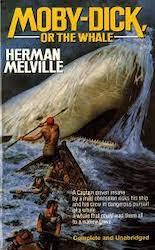
Of Politics & Art
Here, on the farthest point of the peninsula The winter storm Off the Atlantic shook the schoolhouse. Mrs. Whitimore, dying Of tuberculosis, said it would be after dark Before the snowplow and bus would reach us. She read to us from Melville. How in an almost calamitous moment Of sea hunting Some men in an open boat suddenly found themselves At the still and protected center Of a great herd of whales Where all the females floated on their sides While their young nursed there. The cold frightened whalers Just stared into what they allowed Was the ecstatic lapidary pond of a nursing cow's One visible eyeball. And they were at peace with themselves. Today I listened to a woman say That Melville might Be taught in the next decade. Another woman asked, "And why not?" The first responded, "Because there are No women in his one novel." And Mrs. Whitimore was now reading from the Psalms. Coughing into her handkerchief. Snow above the windows. There was a blue light on her face, breasts, and arms. Sometimes a whole civilization can be dying Peacefully in one young woman, in a small heated room With thirty children Rapt, confident and listening to the pure God-rendering voice of a storm.

Norman Dubie
Norman Dubie died this week. RIP
1 note
·
View note
Note
happy nice ask week! i saw that you like poetry, what types of poetry do you like and do you have a favorite poet?
Happy nice ask week to you! I do indeed like poetry 😍 My preference is for modern poetry - 20th century to current day. I think we're in a fantastic time for poetry right now. I need to start keeping better track of new poets popping up doing amazing things.
I have many favourite poets! Off the top of my head, I love: Carrie Etter, Ruth Padel, Angel Nafis, Mary Karr, Rodney Jones, Norman Dubie, Claudia Rankine, Kim Addonizio, Terrance Hayes, Tim Liardet, Mark Doty, DA Powell, Catie Rosemurgy, Anne Carson (for The Glass Essay! Goodness me!), Ted Kooser, Eileen Myles, Sheenagh Pugh... And there are more, always more!
Squishes for you!
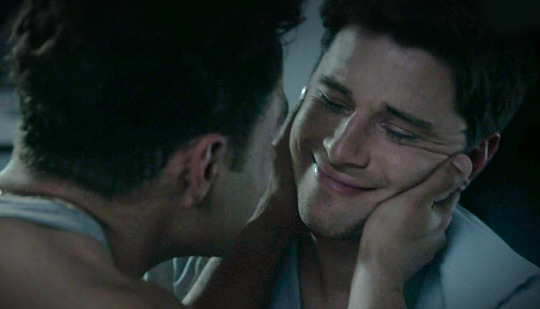
9 notes
·
View notes
Photo
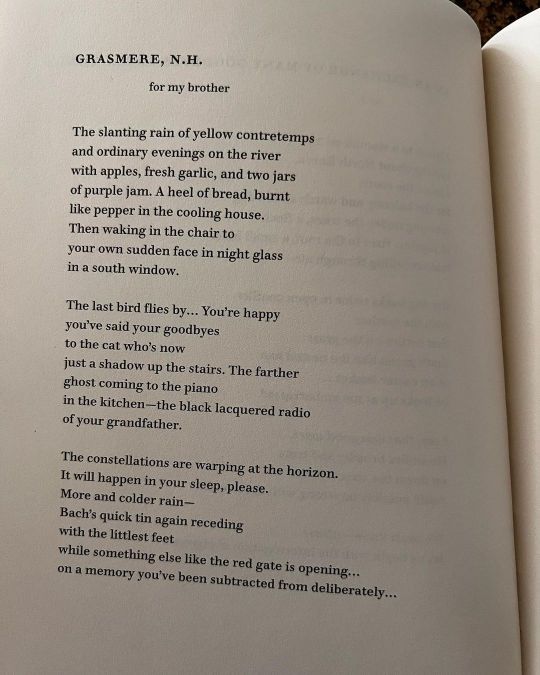
Norman Dubie, my MFA thesis chair and mentor to many generations of poets passed away this morning. He was a poet of immense imagination and one of the most important lessons he taught me was that a poem was full of so many possibilities. Thank you, teacher. https://www.instagram.com/p/Co5ZHwev-Hi/?igshid=NGJjMDIxMWI=
4 notes
·
View notes
Text
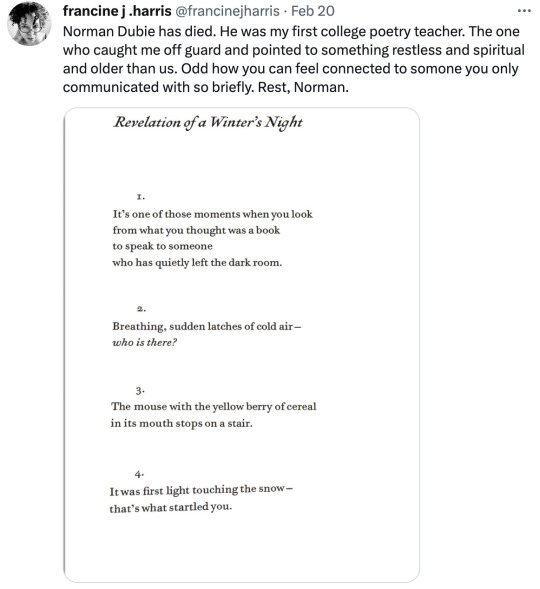
A beautiful celebration of Norman Dubie's memory by the unmatched Francine J. Harris </3
3 notes
·
View notes
Text
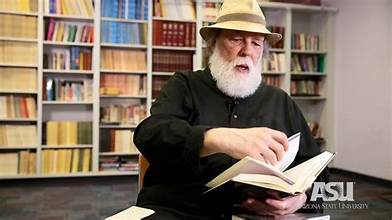
Alredered Remembers , poet Norman Dubie, on his birthday.
She giggles. A front tooth is loose.
With the river bottom clear as the night air,
The bargeman sings through the hungry vapors
Rising now like white snakes behind him.
You told his wife that Lord Buddha made wasps
From yellow stalks of tobacco with a dark spit.
0 notes
Text
what should i do to calm down because i’m currently sitting in bed with stress levels of animal maybe not being hunted but like. an animal who has too many assignments and problems to deal with perchance
1 note
·
View note
Text
I took four courses with him and learned so much and found my voice, but I really missed out when I dropped out of grad school. I'm just glad he left us his poetry to study and embrace.
0 notes
Quote
I’m completely dismayed with the Bush administration and all the complicated ways in which the lives of real people are being ruined now and clearly, deep into the future. . . . God save us, he may get four more years, but I fear that terribly. If they get four more years, I think they’ll try to reverse Roe v. Wade, and then all of our daughters are going to [take to] the streets. And all of a sudden, all those ungodly provisions of the Patriot Act are going to be used on our own children.
Norman Dubie (2004)
4 notes
·
View notes
Text
Of Politics, & Art
Norman Dubie, 1945
—for Allen Here, on the farthest point of the peninsula The winter storm Off the Atlantic shook the schoolhouse. Mrs. Whitimore, dying Of tuberculosis, said it would be after dark Before the snowplow and bus would reach us.
She read to us from Melville.
How in an almost calamitous moment Of sea hunting Some men in an open boat suddenly found themselves At the still and protected center Of a great herd of whales Where all the females floated on their sides While their young nursed there.The cold frightened whalers Just stared into what they allowed Was the ecstatic lapidary pond of a nursing cow's One visible eyeball. And they were at peace with themselves.
Today I listened to a woman say That Melville might Be taught in the next decade. Another woman asked, "And why not?" The first responded, "Because there are No women in his one novel."
And Mrs. Whitimore was now reading from the Psalms. Coughing into her handkerchief. Snow above the windows. There was a blue light on her face, breasts and arms. Sometimes a whole civilization can be dying Peacefully in one young woman, in a small heated room With thirty children Rapt, confident and listening to the pure God rendering voice of a storm.
4 notes
·
View notes
Text
Today’s Poem
The Composer’s Winter Dream --Norman Dubie
for my father
Vivid and heavy, he strolls through dark brick kitchens Within the great house of Esterhazy: A deaf servant’s candle Is tipped toward bakers who are quarreling about The green kindling! The wassail is Being made by pouring beer and sherry from dusty bottles
Over thirty baked apples in a large bowl: into The wassail, young girls empty their aprons of Cinnamon, ground mace, and allspice berries. A cook adds Egg whites and brandy. The giant glass snifters On a silver tray are taken from the kitchen by two maids. The anxious pianist eats the edges of a fig
Stuffed with Devonshire cream. In the sinks the gallbladders Of geese are soaking in cold salted water. Walking in the storm, this evening, he passed Children in rags, singing carols; they were roped together In the drifting snow outside the palace gate. He knew he would remember those boys’ faces. . .
There’s a procession into the kitchens: larger boys, each With a heavy shoe of coal. The pianist sits and looks Hard at a long black sausage. He will not eat
Before playing the new sonata. Beside him The table sags with hams, kidney pies, and two shoulders Of lamb. A hand rings a bell in the parlor!
No longer able to hide, he walks Straight into the large room that blinds him with light. He sits before the piano still thinking of hulled berries. . . The simple sonata which
He is playing has little To do with what he’s feeling: something larger Where a viola builds, in air, an infinite staircase. An oboe joins the viola, they struggle For a more florid harmony. But the silent violins now emerge
And, like the big wing of a bird, smother everything In a darkness from which only a single horn escapes— That feels effaced by the composer’s dream. . . But he is not dreaming, The composer is finishing two performances simultaneously!
He is back in the dark kitchens, sulking and counting His few florins—they have paid him With a snuffbox that was pressed With two diamonds, in Holland! This century discovers quinine. And the sketchbooks of a mad, sad musician
Who threw a lantern at his landlord who was standing beside A critic. He screamed: Here, take the snuffbox, I’ve filled It with the dander of dragons! He apologizes The next morning, instructing the landlord to take This stuff (Da Ist Der Wisch) to a publisher, And sell it! You'll have your velvet garters, Pig!
The composer is deaf, loud, and feverish. . . he went To the countryside in a wet sedan chair. He said to himself: for the piper, seventy ducats! He’d curse While running his fingers through his tousled hair, he made The poor viola climb the stairs. He desired loquats, loquats with small pears!
Ludwig, there are Spring bears under the pepper trees! The picnic by the stone house. . . the minnows Could have been sunlight striking fissures In the stream; Ludwig, where your feet are In the cold stream Everything is horizontal like the land and living.
The stream saying, “In the beginning was the word And without the word Was not anything made that was made. . . But let us believe in the word, Ludwig, For it is like the sea grasses Off which with giant snails eat, at twilight!” But then
The dream turns to autumn; the tinctures he Swallows are doing nothing for him, and he shows The physicians his spoon which has dissolved In the mixtures the chemist has given him! After the sonata was heard: the standing for applause Over, he walked out where it was snowing.
It had been dark early that evening. It’s here that the Dream becomes shocking: he sees a doctor In white sleeves Who is sawing at the temporal bones of his ears. There is A bag of dampened plaster for the death mask. And Though he is dead, a pool of urine runs to the
Middle of the sickroom. A brass urinal is on the floor, it is The shape of his ears rusting on gauze. The doctors
Drink stale wassail. They frown over the dead Beethoven. Outside, The same March storm that swept through Vienna an hour before Has turned in its tracks like the black, caged panther On exhibit in the Esterhazys’ candlelit ballroom. The storm crosses Over Vienna once more: lightning strikes the Opera House, its eaves And awnings filled with hailstones,
Flames leaping to the adjacent stables! Someone had known, As thunder dropped flower boxes off windowsills, Someone must have known That, at this moment, the violins would emerge In a struggle with the loud, combatant horns.
6 notes
·
View notes
Quote
On the first day of Lent / Two children took their own lives: / Their bodies / Were sewn into goatskins / And were dragged by the hangman’s horse / The three miles down to the sea. / They were given a simple grave in the sand.
Norman Dubie, “An Annual of the Dark Physics”
8 notes
·
View notes
Text
A poem by Norman Dubie

Romance
A gray plate of steaming mussels and a draught saucer of butter with floating slivers of garlic— Van Gogh coughs an affirmation at his brother who puts his brown cigarette on the edge of the table— he walks down the long street. He entered the rain, leaving the green awning. Each passing second they are somewhat more distant. They're both infected with syphilis. Theo is visiting his new girlfriend. She is not suffering with his infection.
He gives her a dripping wet bouquet of stolen calamus. In fact, Theo thinks she is still a virgin. She isn't. In less than a decade they all are dead and buried. The two brothers believe in the superstition of posterity. Her syphilis actually was congenital. As of last April all of them were entirely virginal. They do remain my best and only imaginary friends. I like a feint of mustard with my mussels. I like the rain.

Norman Dubie
1 note
·
View note
Text
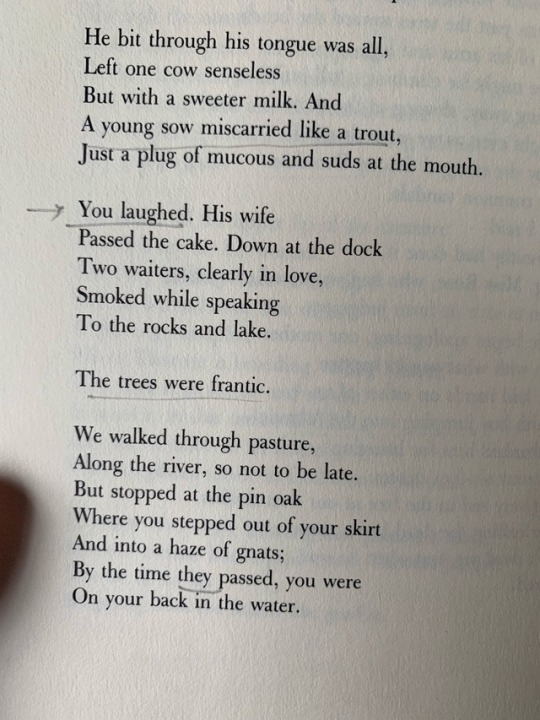
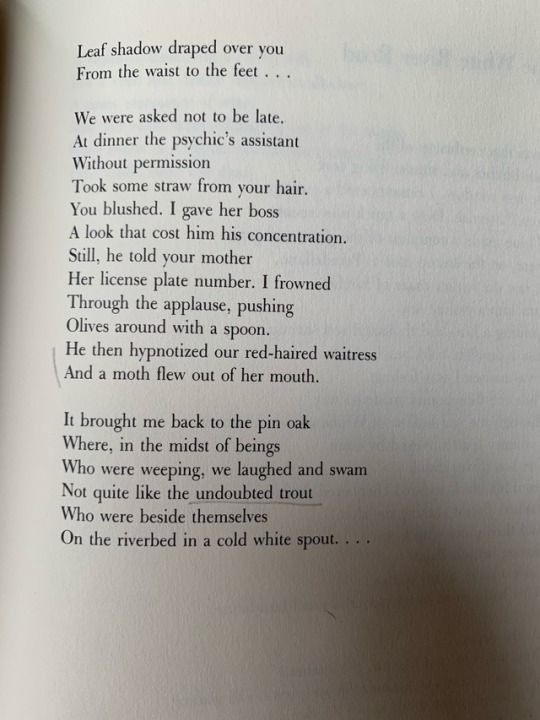
“Where, in the midst of beings / Who were weeping, we laughed and swam / Not quite like the undoubted trout”
Norman Dubie
8 notes
·
View notes
Photo
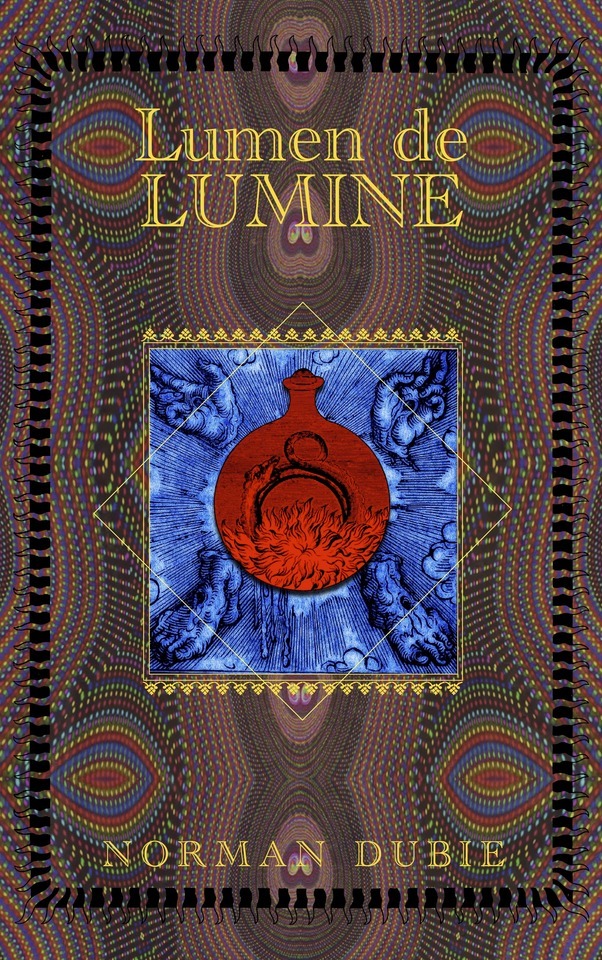
LUMEN DE LUMINE
We are very excited to offer this fascinating collection of Norman Dubie’s aphorisms, dubbed a fragment and prequel to The Clouds of Magellan, this book is designed to be a talisman, a hermetic and alchemical notebook of verse and wisdom, spanning time, literature, consciousness, nothing less than cosmic.
1 note
·
View note